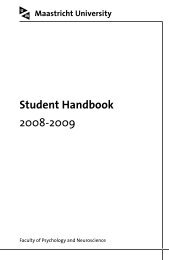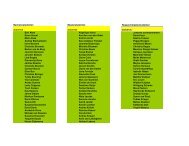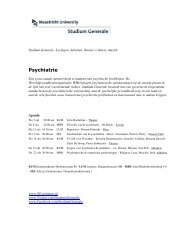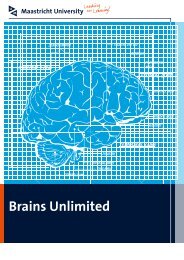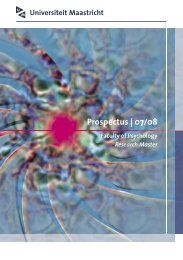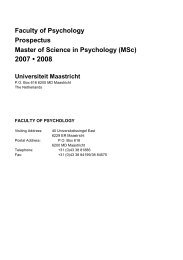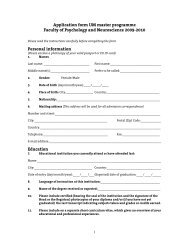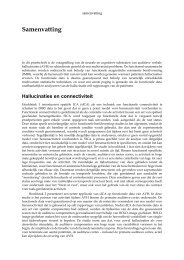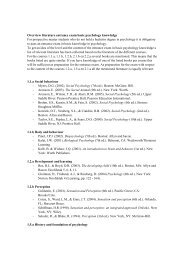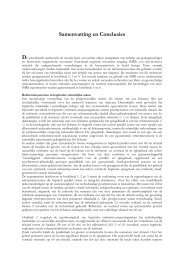Prospectus | 08/09 - Psychology and Neuroscience - Maastricht ...
Prospectus | 08/09 - Psychology and Neuroscience - Maastricht ...
Prospectus | 08/09 - Psychology and Neuroscience - Maastricht ...
Create successful ePaper yourself
Turn your PDF publications into a flip-book with our unique Google optimized e-Paper software.
<strong>Prospectus</strong> Research Master <strong>Psychology</strong> 20<strong>08</strong> • 20<strong>09</strong><br />
Form of Assessment<br />
Written assignments.<br />
1<strong>08</strong><br />
| 581PP Clinical Skills III: Clinical Interview for the DSM IV (SCID I <strong>and</strong> SCID II)<br />
– 1 credit<br />
Coordinator: Reinier Kreutzkamp, Clinical Psychological Science (FPN), Phone 38 81605,<br />
50 Universiteitssingel, Room 1.324, E-mail: r.kreutzkamp@dep.unimaas.nl<br />
Description of the Course<br />
The aim of this training is to teach students how to conduct the semi-structured<br />
clinical interview for the DSM-IV-Tr Axis I (SCID I) <strong>and</strong> Axis II (SCID II) diagnoses.<br />
Students will learn to interpret the outcome of these interviews, to establish<br />
differential diagnoses, <strong>and</strong> to summarize findings in a written report.<br />
Instructional Approach<br />
Four 2-3 hour practical sessions <strong>and</strong> demonstrations.<br />
Form of Assessment<br />
Students’ skills in the above areas will be assessed on the basis of observation of their<br />
interview behaviour as well as on their written reports.<br />
| 582PP Clinical Skills IV: Intervention Techniques – 1 credit<br />
Coordinator: Marisol Voncken, Clinical Psychological Science (FPN), Phone 38 81253,<br />
50 Universiteitssingel, Room, 1.351, E-mail: m.voncken@dep.unimaas.nl<br />
Description of the Course<br />
Cognitive behavioural therapy (CBT) is a widely used treatment regimen that is seen as<br />
the evidence-based treatment for various psychopathological disorders such as anxiety<br />
disorders <strong>and</strong> depression. The behavioural component, exposure, was developed in<br />
the sixties by researchers like Skinner <strong>and</strong> was considered a breakthrough for specific<br />
phobias <strong>and</strong> obsessive-compulsive disorder. These disorders were seen as untreatable<br />
at that time. In the eighties the cognitive component started to develop. Aaron Beck,<br />
in those days trained as a psychoanalytic therapist, was able to treat depression<br />
within a few months with his cognitive approach. This was also a breakthrough, as<br />
psychoanalytic treatments for depression at that time normally took years. Researchers<br />
<strong>and</strong> therapists started to combine the behavioural <strong>and</strong> cognitive techniques, resulting<br />
in cognitive behavioural therapy. Over the years many studies have shown the<br />
effectiveness of this treatment, <strong>and</strong> in the Netherl<strong>and</strong>s CBT is included in the official<br />
professional guidelines for treatment of anxiety disorders <strong>and</strong> depression.<br />
The aim of this training is to teach students some of the basics of CBT for relatively<br />
simple forms of psychopathology. This training will focus on main elements of CBT,<br />
that is, 1) making a functional analysis of a case, 2) explaining the rationale of exposure



